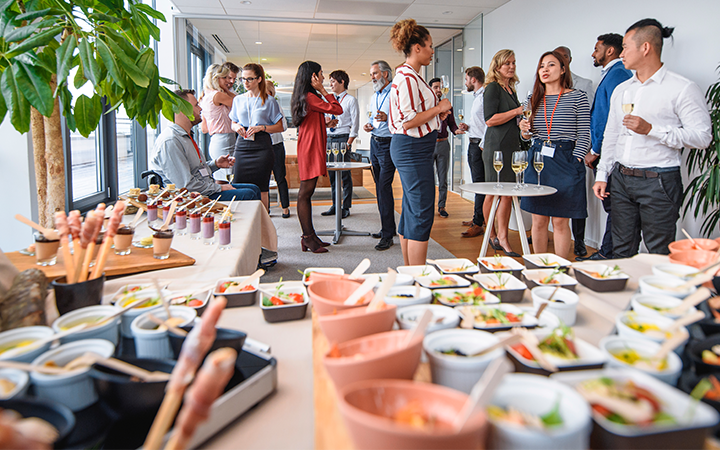INSIGHTS
Top tips to creating a more sustainable event
The Asia Pacific meetings, incentives, conferences, and exhibitions (MICE) industry is booming, capturing over 22% of the global industry’s revenue in 2023. This fast-developing region saw a market size of USD 183.47 billion (AUD 280 approx.) in 2023 and is not slowing down anytime soon (Grand View Research, 2024). More businesses are embracing mixed work cultures, increased business travellers on the move, and ongoing employee engagement can be attributed to this rapid growth.
With such a large footprint, sustainability isn't just a buzzword—it's a must-do. It's not surprising that the events industry can have a significant environmental impact, and there is a growing demand for better sustainable practices. These include reducing waste, greenhouse gas emissions, energy consumption, and adopting eco-friendly practices to reduce your event's environmental footprint.
Here's how to make sure you're planning sustainable meetings and events.
Reduce carbon-emissions

Ever driven yourself to an event only to realise most of your colleagues did the same? Transport represents a significant portion of the carbon footprint associated with MICE events. Choosing a location that is easily accessible for participants, with convenient transport options and appropriate infrastructure, is important.
-
Run fun competitions to invite attendees to use public transportation or cover the cost.
-
Arrange group travel or carpool. Nothing starts the vibe like a minibus full of people you know, en route to the same destination.
-
If hiring cars is needed, choose eco-friendly, hybrid or electric transportation options.
-
Opt for carbon-neutral travel or purchase carbon offsets on longer trips, including flights.
Accommodation and venues
Many hotels and venues are already in the know when it comes to responsible sourcing, and can be great allies. From eco-friendly cleaning practices to waste management, work health and safety, low-carbon buildings, in-house greeneries, and farm-to-table food, there are plenty of options. Our personal favourite is Accor Group.
- Choose an eco-friendly and socially responsible hotel or event venue.
- Use our slick Venue Finder tool to lock in your next venue.
Food, drinks and snacks

Did you know that 40% of globally produced food doesn’t reach anyone’s plate? Food waste is a mounting issue in Australia, and the event industry can be a notorious offender. Do you remember the last event you went to? Was there leftover food or food packaging? Where do you think that went? With 1.3bn tons of food waste annually globally, we can almost guarantee it was headed straight for the bin, and we don't mean the recycling bins!
-
Go local with produce to boost the economy and cut logistics costs.
-
Collect attendee data to reduce food waste—know your numbers and dietaries.
-
Compost food waste instead of binning it in general waste.
-
Use 'ugly' fruit and veggies to whip up delicious meals. Farmers often sell smaller, or misshapen fruit and veg direct, at a price much lower than big supermarkets.
-
Single-use plastics are out, and biodegradables are in. If needed for catering, opt for wooden, bamboo, or compostable single-use products.
Gifts and merch

No doubt, everyone loves free goodies. But forget pens, magnets, and notebooks wrapped in single-use plastics. Opt for higher-quality, memorable and relevant items that will be used time and time again—and spoken about in the office hallways.
-
Pick gifts and merch that are useful and appreciated—less landfill, more smiles.
-
Think eco-friendly. Reusable straws, keep cups, or sustainable clothing.
-
Replace physical items with digital gifts such as eBooks, online courses, and virtual gift cards.
-
Offer experiences like local tours, workshops, or wellness sessions instead of physical items.
-
Get creative with the situation. How about travel adaptors for international events? Or recovery kits for the trip to and from?
-
Support social enterprises or charities with your gifts—think handmade, or icebreaker items that contribute to a greater cause, like SolarBuddy lights.
Theming, display, and décor

Balloon arches are trending right now. But once-off decorations go straight to landfill after the event and pose potential risk to waterways, and native animals if they aren't disposed of responsibly. Instead, think crepe paper, bunting, tissue paper, flowers and foliage, and reusable branded décor to brighten up your event.
-
Use local, seasonal flowers or real potted plants to cut down on transport and storage energy. These also make a great gift for attendees to take home at the end of the event.
-
Replace single-use décor with interactive digital screens and games.
-
With only 9% of plastic worldwide actually being recycled, consider ditching the plastic decorations like balloons and plastic banners.
-
Reuse branded items like pop-up banners, media walls and tablecloths instead of printing new.
-
When choosing TV screens and displays, consider low-energy options like LED.
Event resources

Have you gone home after an event with a cheap tote bag filled with plastic gifts, and a trillion pamphlets? Do you usually keep it for a few days before finally showing it to the bin? We've all been there. Here's how to minimise the take-homes:
-
Swap printed programs and promotional material for an event app or website, leaving those costly, wasteful print runs behind.
-
Use digital ticketing, invitations and guest registration systems.
-
Create virtual booths for sponsors and vendors that attendees can visit online.
-
Apps are great for push notifications, venue maps, and registration help.
-
If you must print, use recycled materials and skip the glossy finish so they can be properly recycled later.
Charity and Community

Ethical business practices and social responsibility are foundational pillars of sustainability in the MICE industry.
-
Collect donations or host fundraising galas and encourage attendees to revisit the cause after the event is finished.
-
Include workshops or icebreakers that benefit local communities or social enterprises.
-
Donate items to those in need. Unused, unopened food or catering materials? These could go a long way.
-
Unfortunately, in our modern world, slavery and human trafficking still exist in many regions. Do your research and choose to work with suppliers and vendors who value their staff, whilst supporting their growth and development.